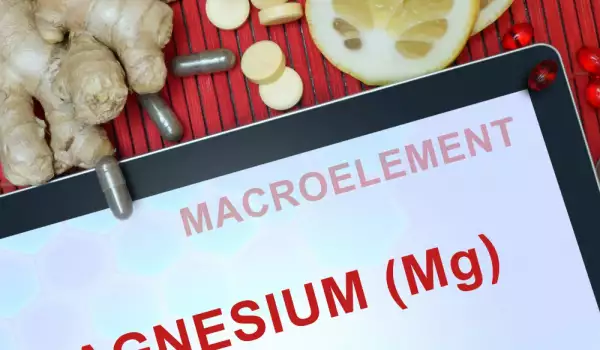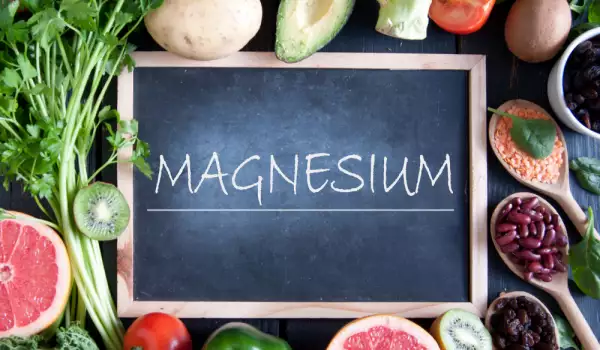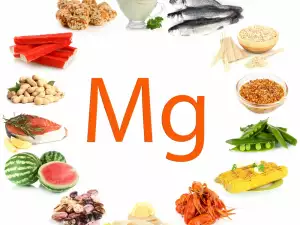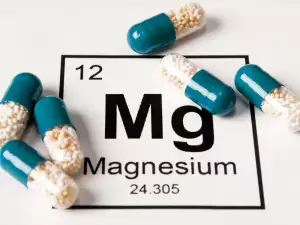Magnesium is generally classified as a macro mineral, meaning that our food should provide us with hundreds of milligrams of magnesium each day. The remaining macrominerals that people need to obtain daily are: calcium, phosphorus, sodium - nutritional, potassium and chloride.
Magnesium is contained mostly in the bones of the human body (60-65%), but also in the muscles (25%), as well as in other types of cells and body fluids. Like all minerals, magnesium cannot be produced by the human body and must be obtained through food. The human body contains about 20-30 g of magnesium.
Functions of magnesium
- Bone formation - about two-thirds of magnesium in the body is found in bones. Some of the magnesium in bones helps build their physical structure, as it is found in the skeleton of bones along with the minerals phosphorus and calcium. Another amount of magnesium, however, is found on the surface of the bones and acts as a storage site for magnesium that the body can use during times of poor nutritional supply.
- Relaxation of nerves and muscles – magnesium and calcium work together to regulate the body's nerve and muscle tonicity. In many nerve cells, magnesium serves as a chemical blocker so that calcium cannot reach the nerve cell and activate a nerve.
- In patients with diabetes, magnesium prevents various vascular complications and combined with selenium, zinc and chromium, improves the functions of the pancreas.
- In diseases of the respiratory tract, it supports the expansion of the bronchi and removes painful bronchospasms.
- Magnesium has a very positive effect on the organs of the reproductive system. In pregnant women, together with folic acid, they prevent malformation of the fetus, premature birth and the development of toxicosis. During menopause, magnesium helps to reduce the negative effects that this condition causes.
Over 300 different enzymes in the body require magnesium to function. Magnesium is involved in the metabolism of proteins, carbohydrates and fats. It also helps genes function properly. The cardiovascular system, digestive system, nervous system, muscles, kidneys, liver, hormone-secreting glands and brain rely on magnesium for their metabolic functions.
Daily dose of magnesium
The recommended daily intake of magnesium for men and women between the ages of 16 and 60 is 280 mg for women and 330 mg for men. The US National Academy of Sciences has set the tolerable upper limit (UL) for magnesium intake of 350 milligrams per day for individuals 9 years of age and older. However, this limit only applies to magnesium obtained from dietary supplements.
Magnesium deficiency
Because magnesium plays such a wide variety of roles in the body, magnesium deficiency symptoms can vary widely. Many of the symptoms include changes in nerve and muscle function, such as muscle weakness, tremors and spasms. In the heart muscle, magnesium deficiency can lead to arrhythmia, irregular contraction and increased heart rate.

Due to magnesium's role in bone structure, softening and weakening of bones can also be a symptom of magnesium deficiency. Other symptoms include: unbalanced blood sugar levels; headache; increased blood pressure; increased blood fats; depression; seizures; nausea; vomiting and lack of appetite.
For some foods that are higher in magnesium, it has been found that when they are dissolved in water - blanching, steaming or boiling - a significant amount of magnesium can be lost. However, in other foods, such as almonds and peanuts, there is very little loss of magnesium during roasting or processing.
Certain types of diuretics used to lower blood pressure, including thiazide diuretics such as Diuril or Enduron, compromise the magnesium status of the human body. Antibiotics can also lead to lower magnesium availability.
Magnesium overdose
The most common symptom of toxicity associated with high magnesium levels is diarrhea. Magnesium toxicity can also be associated with very common symptoms such as increased sleepiness or feeling weak.
Magnesium benefits
Magnesium may play an important role in the prevention and/or treatment of the following diseases: alcoholism, angina, arrhythmia, asthma, chronic fatigue, congenital heart disease, coronary disease, diabetes, epilepsy, heart attack, AIDS, hypertension, inflammatory bowel disease, migraine, multiple sclerosis, osteoporosis, peptic ulcer, PMS, etc.
Magnesium can be purchased as a dietary supplement in one of two basic forms: chelated or unchelated. Chelated magnesium is bound to building blocks of proteins (called amino acids). The most widely available supplements of this type are magnesium glycinate, magnesium aspartate and magnesium taurate.
Magnesium can also be attached to an organic acid (such as citrate) or a fatty acid (such as stearate). Non-chelated magnesium compounds include magnesium oxide, magnesium sulfate and magnesium carbonate.
Sources of magnesium
Excellent sources of magnesium are Swiss chard and spinach. A very good source of magnesium are: mustard, squash, broccoli, low-quality molasses, halibut, turnips, pumpkin seeds and mint.

Other good sources of magnesium are: cucumbers, green beans, celery, cabbage, sunflower seeds, sesame seeds and flax seeds. Coffee and cocoa are also good sources of magnesium. Nuts such as walnuts, cashews, almonds, peanuts, pine nuts, Brazil nuts are very rich in this trace element.
Spices are a very good way to get magnesium. Spices with magnesium are basil, paprika, mint and lemongrass. Drinking tap water is a great way to get plenty of magnesium.
About 60% of magnesium in the body is found in the bones, the rest is in the body's tissues and only about 1% is found in the blood.
While many of us suffer from magnesium deficiency, others may have too much and still others may suffer from insufficient intake, so unless doctors recommend magnesium supplements, the deficiency can be corrected with the following foods, as long as we introduce them into our daily diet, in the right amounts.
Almonds
Magnesium content: 105 mg per quarter of a cup
Among the many benefits of almonds for the whole body are that they are rich in vitamin E, an antioxidant that helps the immune system and supports visual health. Also, almonds help us lose weight and keep our heart healthy due to the omega-3 intake. To get more of them, add them to raw desserts, vegan sweets, raw cakes, almond cakes, almond bread, healthy crackers.
Sesame seeds
Magnesium content: 101 mg to 28, 3 g seeds
Among the other health benefits of sesame seeds are that they contain zinc, help with testosterone production and are a good source of iron and vitamin B6. Sesame seeds are good to sprinkle on baguettes, healthy breads, homemade salads, crackers. Sesame tahini is suitable for making spreads with chickpeas, Arabic hummus, vegetable patties.
Sunflower seeds
Magnesium content: 128 mg per quarter of a cup
Among other advantages, we list: the content of calcium and polyunsaturated fats, which help to reduce the level of bad cholesterol for the body. Sunflower seeds are a suitable ingredient in raw biscuits, raw bars and savory pancakes.

Bananas
Magnesium content: 33 mg in a medium-sized banana
Other benefits: when bananas are less ripe, they are a good source of starch, a carbohydrate that boosts the metabolism. Bananas also provide a good dose of potassium, which helps lower blood pressure naturally.
Cashew seeds
Magnesium content: 89 mg per quarter of a cup
Other benefits: Cashews provide 10% of the RDI and are a good source of folate and vitamin K.
Tofu
Magnesium content: 89 mg per quarter of a cup
Other benefits: This source of soy protein gives us 43% of the daily dose of calcium and iron, which the body needs to produce hemoglobin, a protein that helps red blood cells deliver oxygen throughout the body. Tofu can be added to egg filo pastry pies, vegan moussaka, Chinese-style spaghetti or prepared as breaded tofu.
Pumpkin seeds
Magnesium content: 74 mg to 28, 3 g seeds
Other benefits: They are a good source of fiber and contain monounsaturated fats, which support heart health. Add pumpkin seeds to gluten-free bread, gluten-free pizzas, healthy biscuits.












Comments